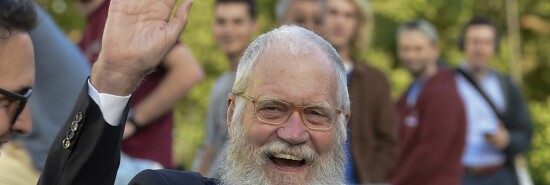
Zelensky does Letterman
Quin Hillyer
Video Embed
An American comedian interviewing a Ukrainian comedian gave viewers a serious reason to recommit to helping repel Russia’s evil invasion.
Longtime late-night host David Letterman traveled to Ukraine to interview that country’s president, the former comedian Volodymyr Zelensky, before a small audience on the platform of a busily operating subway station supposedly safe from Russian missiles. The resulting Netflix special was a public relations tour de force for Zelensky and Ukraine, as it seems well-nigh impossible for any viewer to come away with anything less than deep appreciation and respect for the man and his country.
UKRAINE’S JEWS DENOUNCE RAMPANT MYTH OF NAZISM
Both Letterman and Zelensky used simultaneous-translation headsets, but it was obvious some of the intended points of a few of Letterman’s questions were lost, as Zelensky several times seemed to pick up on some words without quite getting the context. But no matter: The Ukrainian’s answers were illuminating, heartfelt, seemingly guileless, and even winsome.
Zelensky paid profound tribute to those of his countrymen who were on the front line, risking and sometimes giving their lives for the sake of a nation that Russia’s horrid President Vladimir Putin claims isn’t even a separate homeland. He expressed appropriate appreciation for American assistance, saying he knew Ukraine couldn’t have fought off Russian attacks or cared for its people without military and humanitarian assistance from the United States and other Western nations.
And on a more personal level, Zelensky spoke about being separated from his family in order to oversee the war efforts from secure locations but speaking to his wife and young children by phone every day. His 9-year-old son, he said, now knows an astonishing amount about weapons systems and military tactics, which he said in one sense makes him a proud father to see his son so engaged but in another sense grieves him because children should not be spending their spare time studying war.
To lighten what was, to repeat, a surprisingly substantive interview, Zelensky did tell one good joke about observers discussing what Russia says is a war between Russia and NATO. One of the conversationalists, far better informed than the other one, says, “Well, 70,000 Russian soldiers are dead. The missile stockpile has almost been depleted. A lot of equipment is damaged, blown up.”
“And what about NATO?” asks the other.
“What about NATO? NATO hasn’t even arrived yet.”
Told in perfect deadpan, Zelensky’s joke served to remind listeners that however much Western aid is flowing Ukraine’s way, for which he is profoundly grateful, it remains true that the men actually fighting and dying, numbering in the tens of thousands, are Ukrainians preserving their own nationhood.
While those who doubt the U.S. strategic interest in helping Ukraine are sadly mistaken, they will need to see other specials and read other columns to have that case made in a way that finally gets through to them. But for sheer likability and admirability, Zelensky and, through him, his people made again a very human and humane case for why they merit support as they fight for a struggling democracy against a vicious autocracy.
And that’s no joke.
CLICK HERE TO READ MORE FROM THE WASHINGTON EXAMINER
